You’ll probably agree that when warm water is not available, this can be a real nerve test. No doubt, hot water is an essential requirement for everyday living. However, the high costs that come with everyday use of heated water can be off putting for many.
But, what if we told you that hot water does have to be expensive? That’s correct! With a tankless water heater, you’ll have the much-needed hot water on demand, saving you money in the long term. Read on to find out our top five best tankless water heaters on the market.
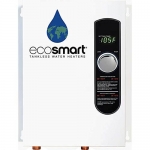
The Ecosmart tankless water heater is one of the most potent heaters in today’s market. It is an on-demand water heater that works well in colder climates, allowing you to work with more than one faucet and sink simultaneously. This water heater has a high capacity, making it suitable for homes and schools alike.
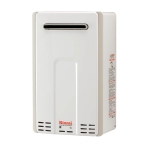
The Rinnai V hot water takes second place on this list for a number of reasons. It’s an outstanding machine, with highly rated features and lots of positive feedback on its durability and performance. The Rinnai heater works well for larger families as well as those that consume large amounts of hot water daily.
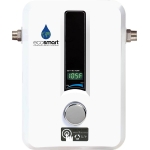
Out of all options in today’s market, the Ecosmart ECO 11 tankless water heater stands out with its impressive design and high efficiency. This is a compact unit featuring a patented modulation system that offers a 99.8 % efficiency. Furthermore, you can use two showers simultaneously, making it an excellent option for all those who’re on a tight budget.
Now that we have given you a quick review of our top three water heaters, we will further highlight the five best units on the market, along with a buying guide and FAQ for more detailed information on features to look out for when purchasing a tankless water heater.
Best Tankless Water Heaters 2021 – Top 5 Reviews
1. Best All-Around Tankless Water Heater – Ecosmart ECO 18 Electric Tankless Water Heater, with Patented Self Modulating Technology Review
 Meet the best tankless heater in the market today – the Ecosmart Eco 18. This heater operates with a world-renowned patented self-modulating technology that offers hot water from various faucets and showers in your home. It does a fantastic job in warm climates, working with up to two sinks and showers each. And during the colder climates, the Eco 18 heater will deliver hot water both to your shower and sink simultaneously.
Meet the best tankless heater in the market today – the Ecosmart Eco 18. This heater operates with a world-renowned patented self-modulating technology that offers hot water from various faucets and showers in your home. It does a fantastic job in warm climates, working with up to two sinks and showers each. And during the colder climates, the Eco 18 heater will deliver hot water both to your shower and sink simultaneously.
All tankless heaters produced under the Ecosmart brand have been designed by experts such that they consume low amounts of energy. This further helps with the reduction of daily heating costs by up to 50%.
All in all, this is a great machine, that also helps to save some space in your home thanks to its compact and wall-mountable build.
Features
- 99.8% energy efficient
- Compact, durable, stylish
- Endless hot water on demand
- Self-modulating technology
- Simple installation
- Compact, stylish design
- Excels in the cold
- Lifetime warranty on the unit
- Power comes in handy in warmer applications
- Relatively affordable
- Stainless elements for durability
- Low effectiveness of flow rate
- Lifetime warranty is questionable
- Occasional bouts of cold water
We recommend the Eco 18 both for larger homes and buildings with heavy hot water needs as well as those with limited space. This ingenious product was put together by skilled personnel to deliver hot water to your pipes with ease.
2. Best Outdoor Tankless Water Heater – Rinnai V Series HE Tankless Hot Water Heater
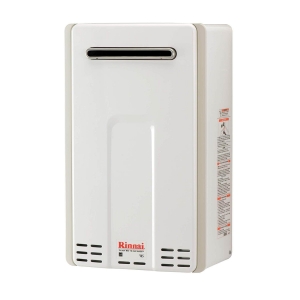 The Rinnai V Series HE Tankless Heater takes second place for good reasons. Firstly, it has been highly praised as an energy-efficient, durable, and well-designed water heater put together by seasoned professionals; such that it delivers hot water as and when required.
The Rinnai V Series HE Tankless Heater takes second place for good reasons. Firstly, it has been highly praised as an energy-efficient, durable, and well-designed water heater put together by seasoned professionals; such that it delivers hot water as and when required.
This water heater has an operation rating of 4.5 stars, and features a concentric model with PVC venting for natural ventilation.
Furthermore, we love the neutral look that offers a seamless blend into any home. And as the Rinnai V heater is also very compact, rest assured it can be swiftly stored indoors, underneath your cabinet, or close to your primary water appliance.
Features
- Built-in Gas Valve Blower
- For commercial applications
- Leak Detection
- 6.6 gallons flow rate
- Scale Detection
- 95% Thermal efficiency
- Digital controllers
- It has a space-saving design
- Space-saving design
- Ultra-low NOx emissions
- Up to 0.96 Energy Factor
- Requires additional OEM parts
- Expensive
- Not the cheapest
Give your household the best, most powerful water heater from Rinnai. The Rinnai HE heater is your best bet if you are after high efficiency whilst still saving both energy and space in your home.
3. Best-Budget Tankless Water Heater – EcoSmart ECO 11 Electric Tankless Water Heater Review
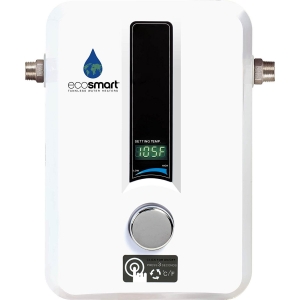 The Ecosmart ECO 11 is another beautiful product from the camp of Ecosmart. We love that it falls under the brand’s umbrella of outstanding products because this means it exhibits traits of exceptional performance, durability, and energy efficiency.
The Ecosmart ECO 11 is another beautiful product from the camp of Ecosmart. We love that it falls under the brand’s umbrella of outstanding products because this means it exhibits traits of exceptional performance, durability, and energy efficiency.
Furthermore, this tankless water heater from Ecosmart is compact in form but still highly efficient. It’s extensive capacity can handle two different showers simultaneously with a flow rate of up to 6 gallons per minute.
No doubt, cabin owners, small households, and those who live in cottages will love the Eco 11 tankless water heater. This machine comes with a lifetime warranty and the best customer team one can find.
Features
- 3 gallons of hot water per minute
- Digital temperature control
- Easy-to-replace elements
- Generous flow rate
- Patented modulation system
- Compact, stylish design
- Excels in the cold
- More energies efficient than competitors
- Power comes in handy in warmer applications
- Price is, comparatively, quite reasonable
- Stainless elements for durability
- Not very good customer service
- Occasional bouts of cold water
- No more than 3 gallons is offered
Trust that the ECO 11 water heater will do more than just provide you with hot water; this compact, highly effective model will work well for both single and multiple applications in small apartments, cabins, and cottages.
4. Best Easy-to-Install Tankless Water Heater – Bosch Electric Tankless Water Heater
 Meet another one of the most convenient tankless water heaters from another top brand. Bosch is a household name, known by people all over the world and has produced a myriad of electronic home appliances. Likewise, their electric tankless water heater gets hot water at the point of use, eliminating the long waiting process that other heaters operate with.
Meet another one of the most convenient tankless water heaters from another top brand. Bosch is a household name, known by people all over the world and has produced a myriad of electronic home appliances. Likewise, their electric tankless water heater gets hot water at the point of use, eliminating the long waiting process that other heaters operate with.
It features a thermostatic control, that can quickly match your temperature needs to the temperature output of your heater. Furthermore, being a great energy-saving model, you get to save hundreds of dollars per year with this economical water heater. It requires minimal maintenance and doesn’t hold water for too long.
This heater is most suited for homes, offices, and all other spaces that require a lower hot water supply. And thanks to its compact form, this heater can be effortlessly stored in small spaces beneath the kitchen or bathroom sink.
Features
- Three great for small spaces
- Great efficiency
- No pressure relief valve is necessary
- Under-sink tankless water heaters
- Understated and attractive design
- Affordable
- CFC-free foam insulation for optimal energy efficiency
- Compact and lightweight
- Glass-lined tank for extended use
- Stylish design
- Supports multiple placements
- Not ideal for large homes
- Limited tank storage
- Not the cheapest for its small sixe
Believe in the Bosch brand and take a chance on their water heater. This is one fantastic water heating machine that gives direct and swift access to all your hot water needs, without much effort. It is also very affordable and space-efficient.
5. Best Compact Tankless Water Heater – ECOTOUCH Tankless Water Heater Electric, with Remote Control
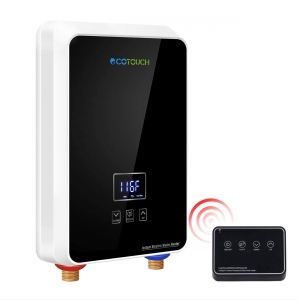 The Ecotouch Tankless Water Heater is an electric beauty with all the needed requirements that enable it to perform its duties with ease. This water heater uses a 5.5kw heating system that supplies consistent hot water to your faucets and showers without the long wait.
The Ecotouch Tankless Water Heater is an electric beauty with all the needed requirements that enable it to perform its duties with ease. This water heater uses a 5.5kw heating system that supplies consistent hot water to your faucets and showers without the long wait.
Armed with this unit in your home, you can now say goodbye to inconsistent hot water flow. And when it comes to energy efficiency, this water heater tops the list. You can save up to 98% energy when in use. More importantly; every piece of this heater is tested consistently to ensure its safety. The parts are also applied with multiple protection devices that run separately to avoid massive buildup and leakages.
No doubt, you’re assured of durability, which is also thanks to the tests and requirements set by the UL and ETL. The sleek beauty that is the Ecotouch water heater is compact, straightforward to install and maintain.
Features
- 5.5kw heating system
- Applied with multiple protection devices
- Compact as an oatmeal box
- Digital display & touch control panel
- Water heater adjusts power input
- Comes with an EZ-link cable
- Hassle-free ventilation
- Package includes a thermostat wire
- Power ventilation for safety
- Space-saving design
- Sturdy gorilla glass casing
- Doesn’t work well in cold areas
- Performance dips when the flow rate increase
- Quite expensive
This water heater comes highly praised for its top performance, durability, and easy servicing. Use this heater with ease in your home, bars, schools, kitchens, salons, and even hospitals.
Best Tankless Water Heater – Buyers’ Guide
What is a Tankless Water Heater, and How Does it Work?
Tankless water heaters are machines responsible for the direct heating of your water. They typically don’t require the use of a storage tank, which is why they are called ‘tankless’. The main aim of every tankless water heater is to deliver hot water to you continuously without any interruptions.
How do these machines work? Tankless water heaters differ from the traditional water heater, which holds and heats your water in a large tank. This machine heats your water as and when it’s needed, and this is done to help reduce standby heat loss. What’s more, the ability to avoid standby heat loss makes the tankless water heater more efficient than all other heaters.
Operating this machine is very simple; cold water travels through a pipe when the hot water tap is turned on. Then the heating of your water is done via the use of an electric element or gas burner.
Things You Should Consider When Choosing One
Choosing the best tankless water heater model can be done via the review of your preferred model online or from existing users, but your search will require much more than that. Before you search for the ultimate tankless heater, you need to be aware that this machine is costly.
With such high rates, you cannot afford to pick the wrong model for your home, as this will cost more in the long run. In the following paragraphs, we compile the vital features you will need to pay attention to before making a purchase.
Energy Efficiency
Energy efficiency is one of the many benefits of going tankless, as stated earlier; the model you opt for should offer this from the onset. When searching for the best model, first determine how much you can save in terms of utility bills, after purchasing the unit.
One way to be sure about the energy consumption of any tankless heater is to first take a look at their Energy Factor (EF). This showcases the overall efficiency of your preferred model; the higher the EF, the more efficient your water heater will be. Also, when compared to gas water heaters, the electric heater systems feature a higher EF, but their high EF doesn’t translate into them being cheaper.
Size
The best tankless water heater is one that can meet all your needs as and when they arise. Investing in a specific tankless water heater should be done only after its temperature rise and flow rate have been examined. After every minute, at the very least, your water heater should deliver up to 5 gallons of hot water to your home.
Flow Rate
To choose a safe tankless heater, it is best to make use of set guidelines, and also to find a unit that offers a flow rate of up to 8 gallons per minute. In the standards, bathroom faucets should deliver up to 5 gallons of water per minute; showers should provide up to 8 gallons, and kitchen faucets should deliver 7 gallons of water per minute.
Gas-powered water heaters, as discussed earlier, provide a higher flow rate than their electric counterparts, and this may drive the majority of individuals to them.
Fuel Type
The type of fuel used by your water heater is a critical decision that must be made during your search for the best tankless heater. While helping bring down your energy costs, your heater must offer a continuous flow of hot water. To do this, you will need readily available fuel. There are three fuel types you can choose from, namely propane, electricity, and gas.
The type of tankless water heater you select is mostly dependent on the fuel available in your area of residence, and how much this available fuel cost. When choosing, compare, and contrast the varying fuel types to find the most cost-efficient and readily available.
Venting
Venting is a highly important factor that helps ensure the proper functioning of your water heater. If you wish to purchase a gas tankless water heater, you should consider their venting processes. Some models have their vents running through the rough horizontally, while others can go otherwise.
For better combustion, be on the lookout for models that support category III ventings. And if you’re picking an indoor tankless water heater, you ‘will’ require venting; it will be compulsory.
Fuel supply lines
Per their design, most gas tankless heaters offer an output of 200,000 BTU. When we discuss the fuel supply line, you need to ensure that the model you choose provides you with all the power your machine needs to deliver instant water as when it’s required.
Ignition
Ignition systems for water heaters come in three different categories. In comparison to cheaper units, the most expensive models feature extremely complex ignition systems. Some ignition systems are elementary, and others a little complicated. It is, therefore, vital to note that, the simpler the ignition system, the fewer savings your heater will claim.
Robustness
The final design consideration we advise everyone to pay attention to is the strength and robustness of their chosen model. Purchasing a model with a long life helps you to save loads of money in the long run.
What Are The Advantages and Disadvantages of Using One?
Cutting down on energy costs is one of the primary reasons why many homes opt for tankless water heaters. When a tankless water heater is healthy for your wallet, it helps you to save up to 40% on your monthly utility bill, which is equivalent to over 30% of energy efficiency when compared to tanked water heaters. There are many other benefits you can derive from using the tankless water heaters, some of which include;
High energy efficiency
The first thing every tankless water heater is known for is its ability to deliver users with instant hot water on demand! If you want to save money on bills, you might need to consider investing in one tankless water heater model. These machines are the most efficient water heaters on the market, with the gas units reaching up to 96% of energy efficiency.
The constant supply of hot water.
Tankless heaters are very different in operation since they heat water only when your shower/faucet is turned on. Also, you never run out of water when you have a tankless water heater in your home. These machines are by design on-demand heaters, meaning that they deliver hot water to you as and when you require it. The best way to view the tankless water heaters is as a machine that allows you to enjoy hot water at the press of a button. With the tankless models, you’ll never experience standby heat loss, since they only require enough power to heat your water amount at that given moment.
Also, to ensure that the temperature of your hot water remains high while in storage, tanked water heaters usually reheat the water in your tank. The consistent reheating leads to energy consumption, which is translated into more bills being paid.
Impressive durability
Tankless water heaters can be used for a very long time, specifically up to ten years without any significant issues. These water heaters, if serviced properly, can be used even longer, reaching the twenty-year mark. Also, when compared to a tanked water heater, tankless water heaters have an extensive lifespan, which makes them the best economic bet for most homes.
Their unmatched durability, however, comes at a high cost you must be willing to pay. Many tankless heaters models are high-end, with very high prices. Nevertheless, potential users are advised not to find their initial cost as too demanding, as this initial price will help you save money in the long run. No doubt, their ability to remain durable ensures you receive ultimate value for your money in the long run.
Compact design
Do you live alone? Or do you have low water demands? The tankless water heaters are the best choice for you. Many homes don’t have any room left for water heaters; thus, they say goodbye to hot water. Luckily, with tankless water heaters, you don’t need a lot of space for mounting. This is a significant difference between the tankless and tanked water heaters on sale.
According to experts, the best water heater is the one that offers you multiple placements on your wall and also allows you to save space within your home. As the tankless water heater is a compact model, it allows you to place them virtually everywhere with ease. Also, they are smaller than typical water heaters, but they must be stationed close to your primary water-based appliance to prevent hot water lagging. Besides this side note, you can place this machine anywhere in your home with ease.
Furthermore, the compact nature of many heater models provides for indoor and outdoor installation, with an anti-freeze kit for thorough protection. If you wish to experience a closer point of use, you can opt for a smaller unit that fits under your cabinet or closet.
On the contrary, tanked heating units are bulky and may not fit the home of their buyers. What’s more, the GPM models of tankless water heaters are the best bet for all homes since they’re compact and don’t consume a lot of space.
Eco-friendly operation
The safest tanks for the environment are those that deliver near-zero-emissions. Typically, models who provide these are the gas tankless water heaters. These are the eco-friendliest machines because they make use of low Nox technology, which is responsible for keeping all emissions as low as possible. The tankless water heaters come with impressive and highly innovative features that prevent scalding water from reaching your faucet or showerhead without generating harmful greenhouse gases.
Also, the tankless heater, though they typically run on gas, still have a reduced environmental impact. This is because they produce fewer greenhouse gases with their operation and also require less energy to work. This is very different for the tanked units.
Easy operation
Operating a tankless water heater doesn’t require a lot of knowledge or skill; the installation is the only hard aspect. Installation of the tankless water heaters will require some amount of help, but after the mounting has been done, the user only needs to set the unit’s temperature to enjoy hot water. If you want to experience a hands-free operation, you might choose a model that supports remote control usage.
Avoidance of floods
When you have a ruptured tank, you stand the chance of experiencing flooding. This happens with tanked heaters, not tankless models. With the tankless heaters, your household is kept safe because it operates with an integrated system. This system is responsible for the detection of all internal faults as and when they occur, offering the user with warnings in advance.
Disadvantages
Pros and cons are widespread for all kinds of products, and tankless water heaters are no different. The process of choosing a product involves deciding that its drawbacks aren’t significant, or that they are still worth the purchase even with the disadvantages. Below, we look at the disadvantages of having or investing in tankless water heaters.
Extra Equipment
Some homes have hard water continuously pumped through their pipes. If you live in areas with hard water, you will require the help of a water softener to reduce the hardness. This requires spending of money, and also the consumption of space in your home.
High initial cost
The traditional tanked water heaters start at $500, a very affordable amount that many homes can offer in a heartbeat. The tankless models, however, start their pricing from $1,000, sometimes going even higher. Besides their purchase, you will need the help of a professional to install this heater properly in your home, and this will come with another cost. If you purchase an electric tankless heater, you won’t need to retrofit a venting system in your home; only gas tankless models require this.
Extensive Retrofitting
The purchase of a gas tankless water heater will require the user to retrofit a gas and venting system within their homes, as we stated earlier. The gas models feature piping systems that aren’t compatible with the venting and piping in most homes. This usually causes homeowners to add new venting, and in some extreme cases, reroute their gas lines.
Fluctuations in Temperature
Tankless water heaters have to heat your water on demand, and as such, they usually require some amount of temperature fluctuations. If you are in a home where multiple faucets are being used, or in a home where the water heater can’t power up to meet your constant demand, fluctuations in temperatures will occur.
Types of Tankless Water Heaters
There are three major tankless water heaters you can choose from; condensing, non-condensing, and condensing hybrids. These three are discussed in detail in the following points, with how they operate and when they’re most required boldly stated to guide all potential owners.
Non-condensing
The first type we discuss is non-condensing water heaters. A non-condensing water heater is a machine that can reach an efficiency of up to 0.85, thanks to the use of a heat exchanger. This model offers you hot water on demand and has been used for decades in Europe and Japan. The primary reason why many people opt for non-condensing models is because of their high reliability. These machines are established products that have been perfected over the years to reduce their manufacturing issues. There are a few of the non-condensing models that have some design drawbacks, like overheating of the exhausts, and a reduction in their overall energy efficiency.
Condensing
The nest tankless water heater type is the condensing type, also known as the second generation of tankless heater models. With this machine, there are two heat exchangers, a primary and secondary one. After working with the primary one, the second heat exchanger is used to heat your water even more. And because it works with two different heat exchangers, the condensing water heater typically consumes more energy than its non-condensing model. With the condensing models, energy efficiency increases to 94%. Users of the condensing unit love that it uses PVC for safe ventilation. This machine comes with a disadvantage, though; it features a higher cost per unit, and in rare cases, lower efficiency in short water draws.
Condensing Hybrid
The final tankless water heater model to be discussed is the condensing hybrid. This modern unit features a small water storage container, which accommodates up to 2 gallons of water at a time. The storage tank acts as a hot water reservoir, which in turn helps to increase energy efficiency, especially for short draws. Out of the three types, the condensing hybrid features the highest rate of energy efficiency, since it reaches up to 0.96 on the energy efficiency scale. The condensing water heater is less expensive than the first two heater types, is easily vented, and relies on new, modern technologies. The use of advanced tech means that small companies produce these models. Such production often comes with a disadvantage, which is issues concerning manufacturing quality and warranty.
Maintenance Tips
Installing a tankless water heater differs significantly from maintaining the heater. We discuss the best ways to keep your water heater in good shape, most of which are simple and easy to follow.
- Attach all hosting lines to all valves on the heater.
- After use, be sure to turn the power source of your tankless water heater off.
- To allow air that’s stuck inside pass through with ease, users should turn on the sinks hot water tap.
- Twist the t-shape handles of your heater to close the purge port valves.
- The three valves attached to your water heater should be closed and turned on.
- To clean your heater effectively, use 2.5 gallons of undiluted white vinegar, and avoid all chemical solutions.
- If your heater isn’t working, try restarting the unit.
- Every model needs to be flushed and drained occasionally. To do this, users must follow all instructions set by the manufacturer, to prevent any damage.
Best Tankless Water Heater – FAQs
How Do I Install a Tankless Water Heater?
Installing a tankless water heater is easier to do when a professional is involved. Users aren’t recommended to install their heaters by themselves, mainly because the local plumbing code doesn’t permit it. In many homes around the world, there aren’t any electrical configurations that meet the set standards, for exceptional performance and ultimate safety. If you don’t want to interfere with the warranty of your products, it is best to employ a professional plumber who understands all the technologies for proper installation.
How Long Does a Tankless Water Heater Take to Effectively Heat Water?
There are different tankless water heaters, and each one operates differently. With this stated, it is safe to say that the time required for effective water heating is dependent on the model, the manufacturers, and the type of heater. Also, we’ve established that these machines are designed to provide you with water on demand, that is, as soon as it’s required. Once the knob is turned on, you only need to wait about a minute before your water begins to heat up.
Are They Safe?
The tankless water heater is very safe for the most part. Answering yes or no to this question will be determined by varying factors; some of which include its location, the type, and the availability of venting. Heaters don’t need to have air in their lines, as this can cause severe damage. Also, where you mount your water heater can lead to a possible water siphoning condition, which can lead to hazardous effects. Once your model is well installed and adequately ventilated, it will be the safest unit you will ever use.
Is a Tankless Water Heater Worth it?
With their high energy efficiency level, reduced cost of maintenance and repairs, we can boldly say that the tankless water heaters are well worth every buck invested. In annual savings, with the tankless unit in your home, you can save up to 107$, which is more than what you can save with a conventional water heater. These machines are 34% more efficient than their competitors, and this makes them a great investment no matter what.
How much money can I save with a gas tankless water heater??
You can save between $5 and $65 off your water heating bill, depending on the water heater model you purchase. Some unique models help you save up to $300 on your next tax bill, and this is a lot of money in a year that can be used for other activities and needs. The amount you get to save is highly dependent on the heater model you choose.
Will one gas tankless water heater be enough to heat my entire home??
If you want a tankless water heater model that is strong enough to heat your entire home, you may want to consider getting the gas-powered ones. These models can work with multiple faucets within your home simultaneously, as well as showerheads and other water appliances. Also, there are some models designed for single faucet use; thus, you must be on the lookout for the one that best suits your home and needs.
Do high altitudes affect my gas tankless water heater?
Yes, the efficiency of your water heater will reduce drastically with every increase in altitude. This is a law of science since gravity comes to play. A gas water heater will lose roughly 4% of its BTU, for every altitude over 4000 feet, moving at a distance of 1,00 feet.
Which is better – hot water heater or tankless?
The gas-fired tankless water heaters are great for homeowners since they help them save $100 annually, with every year they remain in operation. From experts, the tankless heater is well suited for those homes that use up to 41 gallons of hot water daily. This is because they are more energy conscious than the traditional water heaters, and they operate faster to allow you to get hot water as and when it’s needed.
Does a tankless water heater increase home value?
The initial cost of a water heater goes up to $1,000 from $500, after which the installation process will also demand about $1,557 on averagely. With these figures from Home Advisor, a permutation for home value states that homes with tankless water heaters can be sold for up to 4% more than their original cost.
Can you run out of hot water with a tankless water heater?
Tankless water heater systems can be overwhelmed with demand, although their systems can’t run out of hot water. Your water heater might struggle to keep up operations If more than one tap is on and demanding hot water at the same time as other appliances such as showers, washing machines, and dishwashers. The constant need to perform will cause your heater to drain extra power, and this will result in higher electric bills.
Final Verdict
We can say with confidence that having a tankless water heater is excellent. After learning all about its operation and the varying drawbacks one might experience, we are confident that you have more than enough information now to choose the perfect model for yourself, family, or friends you care about.
From this article, and If you’re already into water heaters, you will know all about the benefits that come with having a tankless water heater. These units are the best, most economical option you can invest in, with the Eco 18 being the world’s best model.
You will love how user-friendly it is and how well it performs over the years. The Ecosmart ECO 18 water heater fully embodies what every water heater should be; energy-efficient, durable, and affordable.